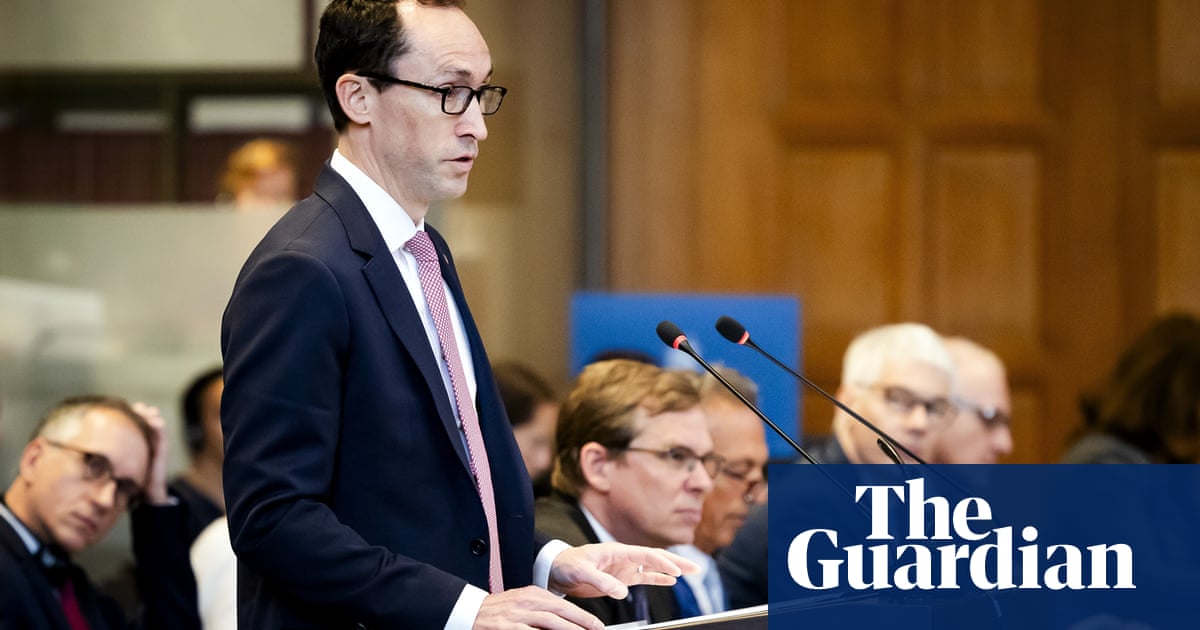Israel’s urgent security needs override its obligations to provide aid to Palestinians in Gaza, a US state department lawyer has told the international court of justice (ICJ).
Joshua Simmons spoke as the United Nations’ top court hears a case on Israel’s ban on cooperation with Unwra, the UN’s main agency for Palestinians.
He said that Israel had no duty under the Geneva convention to cooperate specifically with Unrwa, due to its concerns about the organisation’s links to Hamas – an allegation that has been fiercely contested.
Simmons addressed the ICJ in The Hague on the third day of the hearing and the 60th day of Israel’s complete ban on any aid, food or water enteringGaza. The ban applies to all agencies, but in October the Knesset voted to end all cooperation with Unrwa specifically, bringing its operations to a halt.
Last week, Donald Trump said he had personally urged Benjamin Netanyahu to allow aid into Gaza, but Israel has said the ban would continue until all hostages held by Hamas are released. Trump said he told Israel’s prime minister: “We have got to be good to Gaza.”
In December, the UN general assembly asked the ICJ to give an advisory opinion on Israel’s obligations as an occupying power to provide humanitarian aid, and whether the ban on cooperation and contact with Unrwa breaches its privileges and immunities as a UN body.
Simmons insisted in his alloted half-hour presentation that the US did want to see aid enter Gaza, but denied there was any unqualified legal obligation for Israel to allow this, either as the occupying power or as a UN member state.
He argued that an “expansive” ruling by the ICJ setting out Israel’s obligations and any remedies would be damaging to the credibility of international law.
“Novel legal interpretations will not bring an end to the ongoing conflict. They will not bring the hostages home. They will not create a better tomorrow for Israelis, Palestinians and the region,” he said.
“To be clear, the United States supports the flow of humanitarian aid into Gaza, with the safeguards to ensure it is not looted or misused by terrorist groups. We encourage the international community to focus on advancing a ceasefire and on fresh thinking for a better future for Israelis and Palestinians alike.”
He said the only issues to be addressed were whether Israel was obliged under the law of occupation to cooperate with a third party such as Unrwa to provide aid, and whether Israel had been directed to supply aid by the UN security council.
Arguing that the court had heard little about Israel’s legitimate security fears regarding Unwra, he added: “You have heard concerns about Israel’s decision to cease engagement with Unrwa. You have heard little, however, about the serious, credible concerns about Hamas misusing Unrwa facilities and humanitarian assistance. You have also heard little of Israel’s security needs after the terrorist attacks on 7 October, 2023. These security needs persist today.”
He said the evidence provided ample grounds for Israel to be concerned, and argued that nothing in the Geneva convention placed unqualified obligations on an occupying power to provide aid.
“An occupying power has obligations related to maintaining public order and safety and protecting the civilian population. It also has the right, while an occupier, to pursue its military objectives and govern enemy territory,” he said. “The occupying power does not lose its right to ensure its own security.”
He added that Israel has no obligation to permit Unrwa specifically to provide humanitarian assistance. “Unrwa is not the only option,” he said. “In sum, there is no legal requirement that an occupying power permit a specific third state or international organisation to conduct activities in occupied territory that would compromise its security interests.”
He also questioned the right of the UN general assembly – representing all member states, as opposed to the 15-strong UN security council – to place any obligation on Israel to cooperate with Unrwa.
“The general assembly does not have the power to impose a perpetual obligation to cooperate with Unrwa,” he said. “There should be no finding either as to compliance with any obligations identified in this proceeding, or as to the legal consequences of any alleged breach.”
Israel, in its written submission to the court, argued that the ICJ does not have the necessary investigative tools to determine the competing claims, and that there is no full obligation on Israel to provide aid.
It claimed that the case “is part of an abusive and systematic campaign that regrettably weaponises international law, and international legal institutions, with the aim of depriving Israel of fundamental rights accorded to all sovereign states, including the right to defend itself.”
It added: “The obligations on a state under humanitarian international law are not unqualified and include the obligation of a state in acting to defend its existence, its territory and its people. Israel is fully committed to complying with international law, but that law is not a suicide pact.”
Israel submitted written but not oral evidence to the court by a 28 February deadline, before the total ban came into effect.
The ICJ’s newly elected president, Yuji Iwasawa, a Japanese judge and professor of international law, is sitting with 12 other judges in the five-day proceedings.
